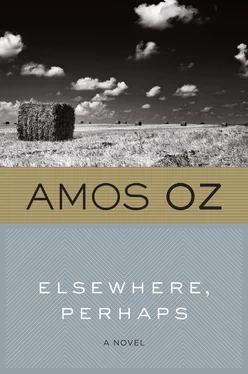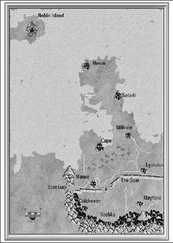Bronka said that one single madman could destroy the whole of mankind.
Zechariah agreed with alacrity and surprising enthusiasm. He added that the next war would be an exciting spectacle. It is uncertain whether he was being serious or not.
They also discussed the principles of the kibbutz. Bronka protested about Zechariah's presents, which she found embarrassing. Zechariah repeated solemnly that he respected the principles of the kibbutz, because he himself was a man of principle. But he had a right to demand that his own principles be respected, and he regarded the right to make small presents to his family as a matter of principle. He was, he might say, a wealthy man now. And a wealthy man had a moral obligation to share his wealth with his relatives, because family bonds were sacrosanct. Moreover, he still recalled how when he had first come to the country in 1948, naked and penniless, his dear brothers Ezra and Nehemiah had not hesitated to share all they had with him.
Zechariah then described life in the new Germany. The leading thinkers spent all their time in self-mortification. Humanity oozed from their every pore. Even if we envisaged Germany as an old whore playing the young virgin, we could still enjoy their embarrassment and laugh wholeheartedly at their clumsy contortions.
At about four o'clock Einav and Tomer arrived, and brought Danny with them. Zechariah, without the least embarrassment, played with the baby and lavished signs of affection on Einav, complimenting her on her good looks and those of her baby. Danny had inherited, he said, his mother's fine features. He was a fortunate child to have such a beautiful mother. The baby's smile was the spit and image of his mother's. And he could claim some expertise in the matter of beautiful women, if they would pardon his lapse from modesty.
Tomer was taken aback when his uncle asked him, with a shrewd, piercing glance, whether he believed in the survival of the soul after death.
Before he had recovered from his surprise, Oren arrived. He was introduced to his uncle and was confronted almost at once with the same curious question. Did he believe in the survival of the soul?
Oren frowned and looked down at the ground as he answered that "soul" was just a literary word and that he, Oren, hated literature. Zechariah smiled till the pink inside of his lower lip showed. Then he offered Tomer, Einav, and Oren the presents he had brought them, saying that they were a token of his fondness for them. Bronka said:
"That's not settled yet."
They drank coffee. Zechariah complained that he was being gorged with food and drink Bronka said he was probably used to finer fare. It's the thought that counts, Zechariah replied. Feelings were more important than food. He had been intending to go to Tel Aviv first, but at the airport that morning he had been overcome by nostalgia and postponed his business. Tomorrow, though, or the day after at the latest he would have to go to Tel Aviv. Force majeure. He had come to find Israeli artistes. The public was crying out for piquant novelties. The Germans were eager to taste the choice fruits of the land, the piquant flavor of the new Israel. They were excited by men with breasts, singing fish, white Negroes, and Israeli Jews — non-Jewish Jews.
Bronka and Zechariah disagreed about the nature of the new Israel. Zechariah maintained that the new Jews were the opposite of the old Jews and that even the moronic Aryans were aware of the fact. Bronka admitted that there was a difference between the Jews of the Diaspora and the Israelis, but claimed that the new Israel was the logical outcome of Jewish history. Zechariah objected that logical terms were neither alive nor dead. Tomer then made an outspoken contribution to the discussion:
"Thanks to the might of Israel, even the Diaspora Jews can hold their heads up high."
Zechariah turned to face him. He brought his face close to Tomer's strong tanned features, and his nostrils and mustache quivered as if he were sniffing the boy's flesh.
"Hold their heads up high? Anyone who holds his head up high is no longer a Jew."
Einav said:
"What a strange idea. I don't agree at all."
Tomer said:
"A Jew is a man, and a man is someone who holds his head up. A proud Jew never stoops."
"Anyone who never stoops is not a man," Zechariah said. "He is more than a man: he is a superman. Like you, my dear nephew. I've heard all about your exploits. But I was talking about ordinary Jews. Heroes are different."
Tomer thought for a moment, then answered:
"Zechariah, you talk as if 'Jew' and 'hero' were opposites. And that's not true."
Zechariah scratched his bushy eyebrows with his thumb and said:
"We mustn't quarrel. I'm heavily outnumbered, and anyway I'm your guest."
And they all laughed out of politeness.
Einav lifted Danny out of his pram.
"Danny says good night. Danny's going to have his supper and go to bed."
Bronka and Ezra said good night to their grandson, Tomer whispered something to Einav, and Zechariah was allowed to kiss the baby. He also kissed Einav on the forehead and on the cheek. Tomer, as he watched, said to himself that it would be best for the man to leave as soon as possible. A man like that was capable of anything.
A quarter of an hour later Oren, too, left, without saying a word. The visitor had given him an idea, and he wanted to think it over for half an hour or so, somewhere else.
As for Tomer, this was the time when he had his daily swim. He asked to be excused. We'll meet again. Perhaps we'll meet again. Yes, we'll meet again perhaps. Perhaps after supper.
Siegfried surprised his hosts by asking Tomer if he could go with him. He was fond of swimming, even if he was not a great swimmer. If Tomer could wait five minutes, he would unpack his swimming trunks and join him.
Tomer was taken aback but managed to smile and say:
"Why not? Do come. I'll bring you back here afterward."
Zechariah nodded to his brother and winked at his sister-in-law. Bronka was startled for an instant: it was a wink of complicity. What was he up to? Nonsense. It didn't mean anything.
***
On their way to the swimming pool Tomer explained, out of politeness, about the buildings they passed. After each description Zechariah thanked him and clapped his hands for joy, as if he had learned some great new truth from Tomer's terse words, which were spoken in fact to forestall an awkward silence or an embarrassing remark from his uncle.
"That's the clinic. One of the first buildings to be built here. It's about thirty years old."
"Thirty years? That's a long time."
"Over there they've dug a shelter, in case of shellings or air raids."
"Oh!"
"That's the memorial to Aaron Ramigolski. One of the founders. He died in the course of the work. It also commemorates the other victims."
"Thank you. Thank you for your kindness, dear Tomer."
But Tomer's efforts failed to have the desired effect. Siegfried did say something embarrassing. Taking advantage of a pause, he said:
"Tell me, my dear nephew, how do you manage to solve the problem of women?"
"What?"
"The problem of women. I mean variety, adventure. I mean — you understand — you're a healthy young lad. Well? Do you go into town sometimes? Or perhaps you manage to amuse yourself here on the kibbutz? Forgive my curiosity. I'm speaking to you as man to man."
Tomer:
"Here… Here we have different customs. We…"
Siegfried:
"Customs may differ, but men are the same everywhere. You surely don't mean to tell me that here on the kibbutz you vigorous young men keep your hands idly in your pockets, to use the old Hebrew phrase? No, I can't believe it. Can it really be that men here look at their neighbors' wives morning, noon, and evening without anything happening? It's impossible to believe. Come on, I can't believe it. I can't imagine it. After all, we're modern men."
Читать дальше












